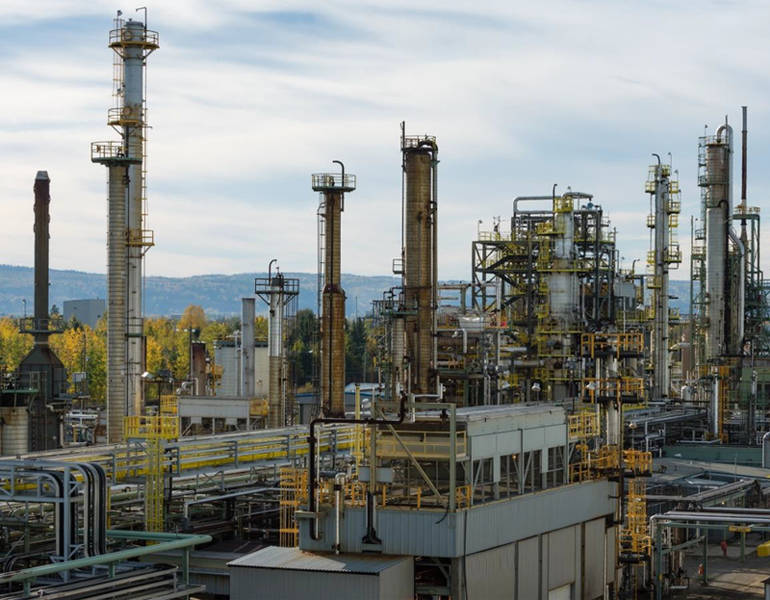In Canada, Tidewater Midstream & Infrastructure Ltd (Tidewater), a diversified midstream and infrastructure company in the North American natural gas, natural gas liquids, and crude oil and refined product space, has disclosed details on various renewable energy initiatives it has been undertaking over the past 6-12 months. These include opportunities in renewable diesel, co-processing, renewable hydrogen, blue hydrogen, renewable natural gas (RNG), carbon capture, and other renewable projects.

Tidewater’s largest current renewable initiative is a 3 000 barrels per day (bbl/d) renewable diesel and renewable hydrogen complex located on the site of Tidewater’s existing Prince George Refinery (PGR) in British Columbia (BC), for an estimated total project cost of CA$215 to CA$235 million.
A stand-alone biorefinery at PGR
The renewable diesel and renewable hydrogen complex will be a stand-alone renewables complex focused on 100 percent renewable feedstock and will include a pretreatment facility to provide Tidewater significant flexibility on running various renewable feedstocks.
Tidewater has received BC government commitments of approximately CA$100 million in the form of BC Low Carbon Fuel Standard (BCLCFS) credits (based on the current market value) for the construction of the complex, representing approximately 45 percent of the mid-point total project cost of approximately CA$225 million.
Project funding is predicated on management’s current estimate of the asset generating over CA$75 million of EBITDA in its first year of operations, which is anticipated as early as 2023, and excludes any incremental EBITDA upside from hydrogen production and the credit value associated with the Canadian Clean Fuel Standard (CCFS).
The consumer use of the produced renewable diesel and renewable hydrogen is expected to reduce carbon intensity (CI) and related greenhouse gas (GHG) emissions by approximately 80-90 percent and 65-75 percent respectively, compared to conventional diesel Tidewater is working through additional means to further reduce the CI of the renewable diesel to be produced.
Canola co-processing projects
Tidewater is completing a canola (aka rapeseed) co-processing project for approximately CA$10 million, and which is expected to commence operations in the fourth quarter of 2021 and is currently estimated to generate over CA$5 million of EBITDA per year.
Tidewater also expects to complete a Fluid Catalytic Cracking (FCC) co-processing project at the PGR, for an approximate CA$10 million, during the next scheduled refinery turnaround in the Spring of 2023.
Project funding of the FCC co-processing project is predicated on management’s current estimate of the asset generating over CA$5 million of annualized EBITDA once it commences operations.
Both co-processing projects have received material BC government support in the form of BCLCFS credits that significantly reduce Tidewater’s net capital contribution. The renewable diesel and renewable gasoline produced by the co-processing projects will have a CI of approximately 80-90 percent less than conventional fuels.
We are pleased and excited at Tidewater to continue our effort in carbon reduction through the development of our Renewable Initiatives. The support shown by the BC and federal governments has been tremendous and we are thankful for the confidence they placed on our renewable energy projects, said Joel MacLeod, Chairman, and CEO of Tidewater.
Existing assets provide strategic advantage
According to Tidewater, its existing assets in BC and Alberta (AB) provide it with a “strategic advantage” in relation to the increasing federal carbon tax, CCFS credits, and BCLCFS credits.
Tidewater’s renewable energy initiatives show BC’s Low Carbon Fuel Standard in action. Credits from the program are supporting projects that will lead to the production of more renewable fuels while generating new jobs and economic opportunities from BC’s resources. Fuel suppliers have a vital role to play in our government’s plans to reduce greenhouse gas emissions from transportation fuels and achieve our climate targets. I applaud Tidewater’s efforts and investments to advance these innovative projects, said Bruce Ralston, Minister of Energy, Mines, and Low Carbon Innovation.
Tidewater is also pursuing other renewable initiatives that are at various stages of development. These initiatives are expected to increase the size and scale of the company’s renewable portfolio and to concurrently add to EBITDA with attractive investment returns.
Tidewater continues to evaluate options to fund its Renewable Initiatives without incurring additional corporate indebtedness, with the Company’s primary objective remaining to deleverage through 2021.
In connection with these efforts, it has engaged CIBC Capital Markets and National Bank Financial Inc as financial advisors to assist the company in understanding the available external financing alternatives to further advance the Renewable Initiatives in an accretive and deleveraging manner.


